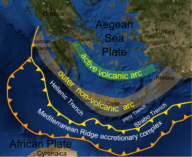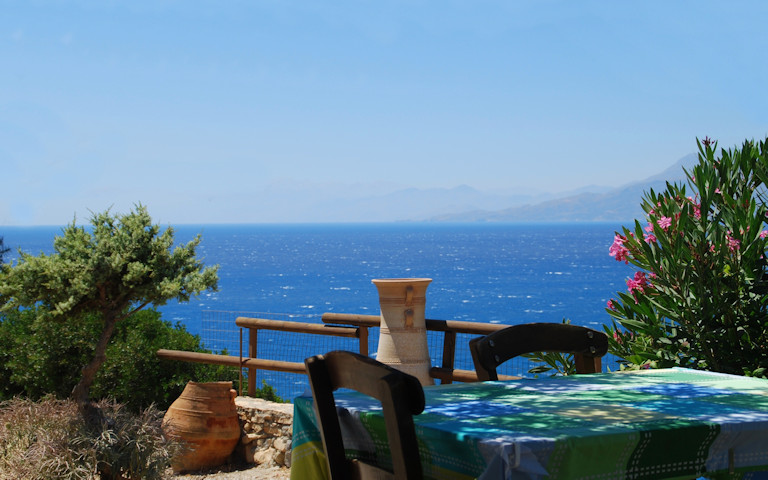The Mediterranean is a geologically active area and so you may wonder if Crete has earthquakes or volcanoes. The short answer is simple enough: Crete has earthquakes but no volcanoes, but it is worth knowing a little more than that…
 Crete exists because of geologic forces, specifically the northward movement of Africa into Eurasia which has pushed mountains up all over southern Europe including the mountains of Crete. This geologic activity is also responsible for volcanoes further north including Etna, Vesuvius, and Santorini. The Mediterranean is also pushed and pulled bu the same forces and is much deeper than many people realise with the deepest part being The Calypso Deep which is found in the Hellenic Trench to the south west of Crete. There is some excellent information about the geology and plate movements around Crete on Sfakia-Crete.com
Crete exists because of geologic forces, specifically the northward movement of Africa into Eurasia which has pushed mountains up all over southern Europe including the mountains of Crete. This geologic activity is also responsible for volcanoes further north including Etna, Vesuvius, and Santorini. The Mediterranean is also pushed and pulled bu the same forces and is much deeper than many people realise with the deepest part being The Calypso Deep which is found in the Hellenic Trench to the south west of Crete. There is some excellent information about the geology and plate movements around Crete on Sfakia-Crete.com
Crete experiences regular earthquake activity and there is a small chance you might experience an earthquake whilst visiting. I estimate I have visited Crete close to 100 times, typically for 2–3 weeks each, and in that time I have only experienced one earthquake. The last notable earthquake around Crete was on 2nd May 2020, which measured approximately 6.6 on the Richter scale. There was no report of damage or injuries. Prior to that the previous significant earthquake was on 27th Nov 2019 and was measured at 6.0 on the Richter scale. This also caused no injuries or damage. EarthquakeTrack shows the biggest earthquakes in the last 20 years have measured 6.6 on the Richter scale. These occurred this year, and in 2013, with the 2013 quake causing minor damage and minor injury only.
The last time there were casualties in Crete from an earthquake was in 1956 when an earthquake in the Dodecanese (north of Crete) triggered a tsunami that killed 53 people. Prior to that the last major earthquake resulting in deaths occurred in 1810 and killed approximately 2,000 people.
As you can probably tell, whilst Crete is prone to earthquakes, the risk to life is very low. The earthquakes experienced on Crete rarely top 6.5 on the Richter scale and at this level they usually only cause minor damage or non at all. Cretan buildings and towns are relatively safe during earthquakes as they tend to be 4–5 storeys tall at most, and are built from steel-reinforced concrete set onto solid bedrock.


উত্তর দিন